BOB ABERNETHY, anchor: After the attack by Islamic radicals five years ago, American Muslims feared violent reprisals against them. Those did not happen, but today many Muslims in this country say they live under the specter of suspicion. They feel their neighbors don't trust them and their government threatens them, as Saul Gonzalez reports.
SAUL GONZALEZ: Orange County, California -- it's a place best known for its surf and sand lifestyle, seemingly endless miles of suburban sprawl, and for being the home of that "happiest place on earth," Disneyland. However, Orange County is also a center of Islam, home to over 130,000 Muslim Americans, many of them immigrants from the Middle East and South Asia. It's a community which once felt largely secure and generally accepted. But like other Muslim enclaves in the United States that has changed in the five years since the Sept. 11 attacks, says Muzammil Siddiqi, an imam and director of the Islamic Society of Orange County.
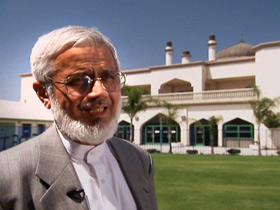
Imam MUZAMMIL SIDDIQI (Director, Islamic Society of Orange County): There are people who say, "I have been here thirty years, forty years. I was never afraid in America, but now I am. I am afraid of my children's future." So, yes, these concerns are there, genuine concerns.
GONZALEZ: Those concerns relate to Muslims' belief that they are still too often viewed with suspicion and even hostility by their fellow Americans. A recent Gallup poll reported that fewer than half of Americans -- 49 percent -- believed U.S. Muslims are loyal to the United States. Muslim Americans also continue to worry about possible government monitoring of their community, from the surveillance of mosques to telephone taps.
Sadullah Khan, a South African-born Muslim scholar and imam in Orange County, echoes other Muslim Americans when he says he feels his civil liberties could be snatched away from him at any moment.
Imam SADULLAH KHAN (Muslim Scholar): I almost feel they could pick me today up for anything. They don't explain anything to you. If they pick me up today, there is nothing you can do about it. Nobody can do anything about it. It's like how it was in South Africa.
GONZALEZ: You think that could happen to you today as a Muslim American?
Sadullah KHAN: Oh, yes. No question. We have no doubt about it.
GONZALEZ: The knock at the door could come …
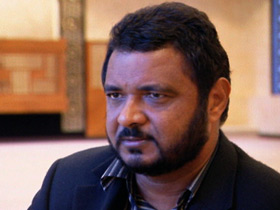
Sadullah KHAN: … at five o'clock in the morning, and there is nothing you can do about it.
GONZALEZ: Now is that reality or paranoia?
Sadullah KHAN: No, not paranoia -- reality. There have been people who have been picked up in our community. There are people who have been deported in our community like that.
GONZALEZ: Many of these fears can be traced back to the days and weeks immediately following the attacks of Sept. 11, when the FBI started investigating possible links between the Muslim American community and suspected terrorists. Many of the 9/11 hijackers, after all, did attend American mosques and Islamic cultural centers as they made their preparations for their attacks.
HUSSAM AYLOUSH (Executive Director, CAIR Southern California): In 2001, when the American Muslim community was introduced to the FBI was when we were being suspected as a whole community. Muslims were visited at 3:00 a.m, They were visited in their home and their schools.
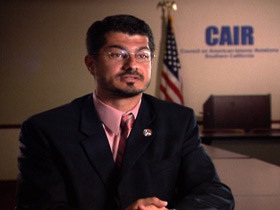
GONZALEZ: Hussam Ayloush is the executive director of the Southern California office of the Council on American-Islamic Relations (CAIR), a civil rights and advocacy group. Although Muslim Americans still have concerns about how the FBI investigates their community, Ayloush says much has improved through continued interaction and improved communication.
Mr. AYLOUSH: Things have changed, and I have to admit to that. The positive atittude from the leadership of the FBI on the national level, but also on the local level, the openness, the agreement to work with the Muslim community as partners rather than suspects has made a big difference. Even when someone is being questioned, there is a high level of respect that is being presented and reflected in the attitude of the FBI towards Muslims.
GONZALEZ: Ayloush credits a number of twon hall meetings between Muslim Americans and the FBI for helping to improve the relationship. In this one, held in June of this year and recorded by Myuslim American activist groups, Stephen Tidwell, the agent in charge of the Los Angeles FBI office, assured local Muslims that his agency's investigations target only suspected radicals and are tightly controlled.
STEPHEN TIDWELL (speaking at town hall meeting): There are rules and there are guidelines for how we begin the investigation, how we conduct the investigation, and how and why we keep the investigation open."
GONZALEZ: As Muslim Americans work to improve their relationship with federal investigators, they have also launched campaigns to enhance Islam's image in this countryl. Thos efforts range from the creation of public service announcements --
(from announcement produced by CAIR): "Islam is not about hatred and violence. It is about peace and justice."
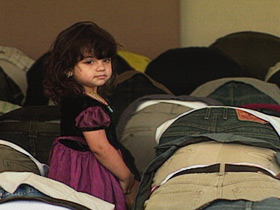
GONZALEZ: -- to open house events offered by hundreds of U.S. mosques. In the open houses, non-Muslim visitors are offered tours of the mosques and given lessons about the fundamentals of Islamic history, culture and religious practices.
JAVED CHAK: What we are trying to do is reach out to the local people here so that they can understand where we come from and what our beliefs are.
GONZALEZ: Javed Chak helped to organize a recent open house at a mosque in Orange County. It was one of several held by the house of worship since the Sept. 11 attacks.
Mr. CHAK: The whole effort is to build the bridges so that there is no misunderstanding, and we think it is making some impact. It is not going to make it overnight, the impact. And I think we are making a good relationship with the various communities.
GONZALEZ: Even as Muslim Americans continue to struggle for acceptance and understanding in this country in the wake of 9/11, some scholars say they enjoy certain advantages compared to Muslim communities in other parts of the Western world. That's thanks, they say, to America's greater acceptance of religious faith in all of its forms.
REZA ASLAN (Author, NO GOD BUT GOD): In America there is not the same struggle to reconcile the identity of being a Muslim in the West that you see in parts of Europe.
GONZALEZ: Reza Aslan, the author of NO GOD BUT GOD, is an expert on Islamic history and culture. He says because of the value the United States places on both religious faith and secularism, Muslims in this country are creating a uniquely American style of Islam.
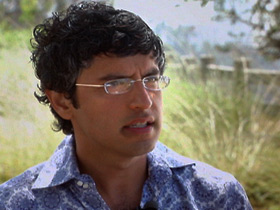
Mr. ASLAN: There is this great debate taking place throughout the Muslim world about whether Islam can reconcile itself with the realities of the modern world -- whether there can be such a thing as reconciliation between Islamic values and, say, democratic values, or Islamic values and enlightenment principles or democracy, etc. etc. And yet here we are a community in which that reconciliation has come incredibly easy.
GONZALEZ: Aslan argues that the very presence in the U.S. of a strong Muslim community creates a powerful alternative to the voices of radical Islam in other parts of the world.
Mr. AZLAN: We American Muslims have not just an opportunity but a responsibility to provide an ideological counterweight to these ideologies of extremism and militantism. So what we have in the United States is unique opportunity to not just reframe perceptions of Islam in this country and to not just counteract the voices of extremism and militantism that are coming out of parts of the Arab world, but to essentially create a new kind of Islam -- an Islam for the 21st century.
For RELIGION & ETHICS NEWSWEEKLY, I'm Saul Gonzalez in Orange County, California.






